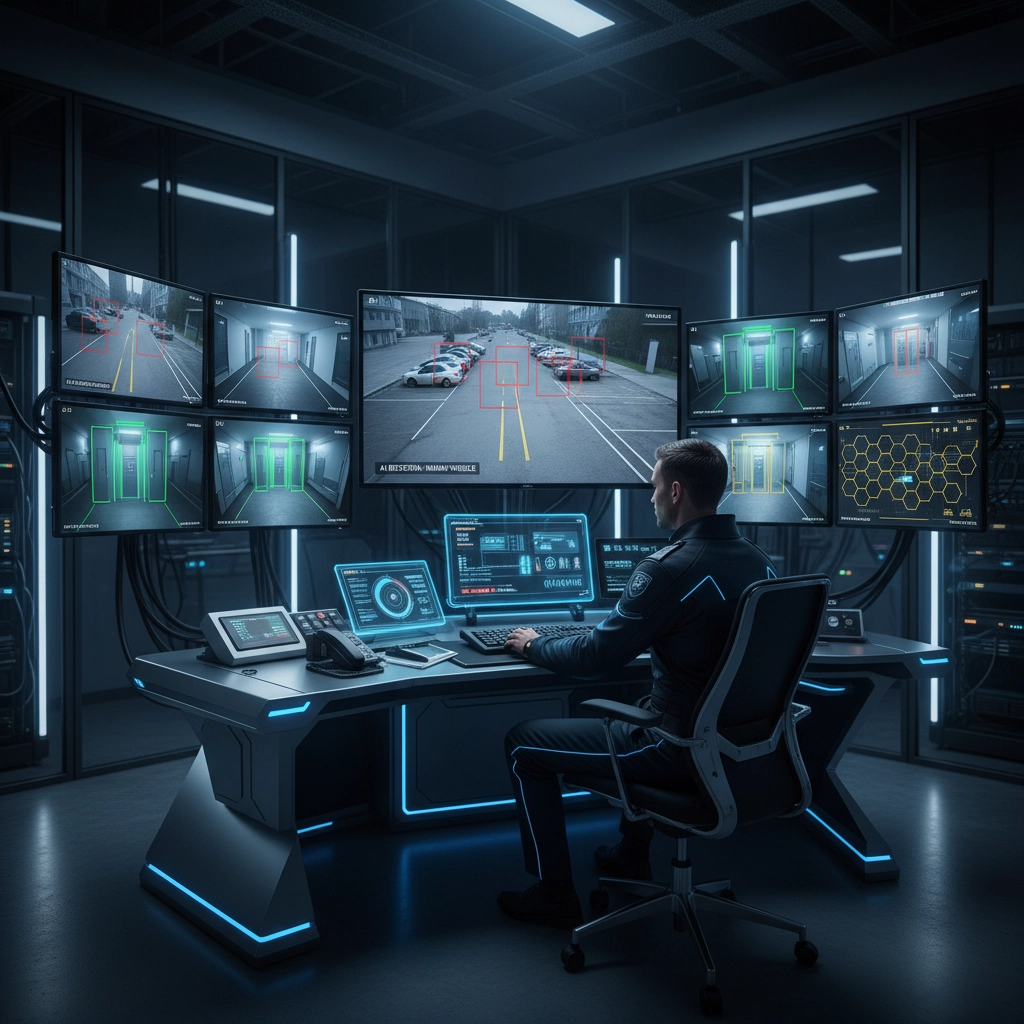AI Surveillance vs Traditional Patrols: Which Is Better For Your Security Career?
- bouf55
- Sep 15
- 5 min read
The security industry is experiencing a massive shift. Artificial intelligence is changing how we think about protection and surveillance, while traditional patrol methods continue to prove their worth in countless situations. If you're considering a career in security, you're probably wondering: should you focus on high-tech AI systems or stick with proven patrol techniques?
The answer isn't as simple as choosing one over the other. Both paths offer unique opportunities, challenges, and career prospects. Let's break down what each approach means for your future in security.
The Rise of AI-Powered Surveillance
AI surveillance systems are becoming the backbone of modern security operations. These smart systems can monitor dozens of cameras simultaneously, recognize faces, detect unusual behavior, and alert human operators to potential threats in real-time.
What makes AI surveillance attractive for your career?
First, it's incredibly efficient. While a human guard can only focus on one area at a time, AI systems process multiple video feeds 24/7 without getting tired, distracted, or needing breaks. They can spot patterns that humans might miss and react faster than any person could.
From a career perspective, working with AI surveillance puts you at the forefront of security technology. You'll develop skills in system management, data analysis, and threat assessment that are increasingly valuable in today's market. Many employers are actively seeking security professionals who understand both the capabilities and limitations of AI systems.

The technical skills you'll need include:
Understanding camera networks and monitoring software
Interpreting AI-generated alerts and data
Managing false positives and system calibration
Coordinating responses based on automated threat detection
Basic troubleshooting of surveillance equipment
However, AI surveillance isn't perfect. These systems can generate false alarms, struggle with unusual situations they haven't been trained for, and can't provide the human judgment needed in complex scenarios. They're also only as good as their programming and the quality of their cameras and sensors.
The Enduring Value of Traditional Patrols
Traditional security patrols might seem old-fashioned compared to AI systems, but they offer something technology can't replicate: human presence and judgment.
When you're on patrol, you're not just watching for threats – you're actively deterring them. A visible security presence makes potential troublemakers think twice. You can interact with people, de-escalate situations, provide customer service, and make split-second decisions based on context that no AI system could understand.
Traditional patrol work offers several career advantages:
Your role is varied and engaging. Every shift brings different challenges, from helping lost visitors to responding to emergencies. You develop strong interpersonal skills, learn to read body language and situations, and build experience in crisis management that translates well to supervisory and management roles.
Physical patrol work also keeps you active and engaged with your environment. You're not stuck behind a desk watching monitors – you're out there making a difference in real-time.

Key skills you'll develop include:
Conflict resolution and de-escalation techniques
Emergency response procedures
Report writing and documentation
Customer service and public relations
Physical security assessment
The downside? Human limitations are real. You can't be everywhere at once, you might miss things when you're tired or distracted, and covering large areas effectively requires multiple personnel.
Head-to-Head Comparison
Let's look at how these two approaches stack up across key career factors:
Factor | AI Surveillance | Traditional Patrols |
Coverage Area | Unlimited (with enough cameras) | Limited by physical presence |
Response Time | Instant detection, delayed physical response | Slower detection, immediate response |
Skills Required | Technical, analytical | Interpersonal, physical |
Career Growth | Technology specialization, system design | Leadership, specialized security fields |
Job Demand | Rapidly growing | Steady, traditional demand |
Work Environment | Control room, desk-based | Active, varied locations |
Salary Potential | Higher with technical expertise | Varies widely by specialization |
Training Requirements for Each Path
AI Surveillance Training: At SecuGuard Academy, we're seeing increased demand for technology-focused security courses. These programs cover surveillance system operation, threat assessment software, and data interpretation. You'll also need ongoing education as AI technology evolves.
Traditional Patrol Training: This path requires comprehensive security guard training covering legal responsibilities, emergency procedures, and hands-on skills. Physical fitness and communication training are also important components.
Future Career Prospects
The security industry is moving toward integration rather than replacement. The most successful security professionals will likely be those who understand both AI systems and traditional methods.
AI Surveillance Specialists can expect growing opportunities in:
Large corporate security operations
Government and critical infrastructure protection
Smart city security initiatives
Security technology companies
Traditional Patrol Specialists remain essential for:
High-end retail and hospitality
Event security and crowd management
Personal protection services
Emergency response teams
Making Your Choice: Practical Considerations
Choose AI Surveillance if you:
Enjoy working with technology and learning new systems
Prefer analytical work over physical activity
Want to position yourself in a growing field
Are comfortable with primarily monitoring roles
Have strong attention to detail and pattern recognition
Choose Traditional Patrols if you:
Value direct human interaction and hands-on work
Have strong people skills and communication abilities
Enjoy varied physical activity and changing environments
Want to develop crisis response expertise
Are interested in supervisory or specialized security roles
Consider Both if you:
Want maximum career flexibility
Are interested in management positions
Recognize that the future lies in AI-human collaboration

The Smart Career Move: Hybrid Skills
Here's the reality: the most valuable security professionals are becoming those who can work effectively with both AI systems and traditional methods. Employers increasingly want staff who can:
Monitor AI surveillance feeds intelligently
Coordinate AI alerts with physical response teams
Understand when human judgment should override system recommendations
Train others on both technological and traditional security methods
At SecuGuard Academy, we're developing integrated training programs that prepare students for this hybrid future. Our comprehensive courses combine traditional security fundamentals with modern technology training.
Getting Started in Your Security Career
Whether you lean toward AI surveillance, traditional patrols, or a combination of both, the key is starting with solid foundational training. Understanding security principles, legal requirements, and professional standards is essential regardless of your specialization.
The security industry offers numerous paths for advancement. You might start as a patrol guard and move into surveillance coordination, or begin with monitoring systems and transition into field supervision. Many successful security managers have experience in both areas.
The choice between AI surveillance and traditional patrols isn't really about picking one over the other – it's about understanding where your interests and skills align, then building expertise that makes you valuable in an evolving industry.
Your security career will likely involve elements of both approaches. The professionals who thrive will be those who embrace technology while maintaining the human skills that no AI system can replace. Start building your foundation today, stay curious about new developments, and position yourself as someone who can bridge the gap between cutting-edge technology and proven human expertise.

Comments